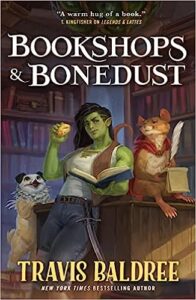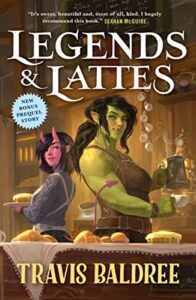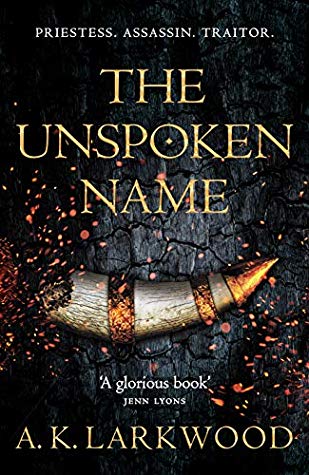This is a prequel to Legends & Lattes, which I adored. It’s a cozy fantasy novel with low stakes and impeccable vibes. Let me skip the conclusion of this review: if you liked the first book, I can’t imagine you won’t also like this one. And if you didn’t like Legends & Lattes, why would you be picking this one up?
There are a lot of the same beats as the first book. While in that one, Viv retired from adventuring, in this one she’s temporarily laid up with an injury. Until her leg heals, she has to wait it out in a village. She’s only been with her adventuring group a couple of months, so she’s antsy to return and nervous of being left behind. Still, she has no choice: for the next few weeks, she has to take it easy.
In book one, we saw Viv build and run a coffee shop with the help of some new friends. In this one, she continues the theme of accidentally collecting friends despite her gruffness, but this time, she’s helping to fix up a bookstore! Viv isn’t a reader, but being barred from strenuous exercise drives her to visiting a rundown bookstore looking for escape. Fern, the rattkin bookseller, manages to make her a reluctant bibliophile. Along the way, Viv helps her to try to save her failing business, starting with a redesign.
One fun difference in the format of this volume is that we get excerpts from the book she’s reading! Fern sensibly starts her with an adventure novel, and then convinces her to try a romance. The excerpted books have their own writing styles, and most of them are sapphic, too.
Speaking of sapphic, I was curious about how the romance element in this prequel would go. I was invested in the romance I knew unfolded later in Viv’s life, so how much could I enjoy a doomed relationship in years prior? That turned out not to be an issue. Both Viv and her love interest know she’s only in town for a few weeks, and they’re both going into this knowing it’s temporary. That doesn’t necessarily make it easy, but there are no hard feelings. Also, I really liked the love interest, who I won’t name because I had fun trying to figure out who it would be. I’ll just say I can see why Viv was interested.
At a glance, this can look like just a retread of the first book: a ragtag group of new friends help to renovate a small fantasy business in a cozy, low-stakes setting. Just swap the coffee shop for a bookstore. In some ways, that’s true—this might have a little more plot and one higher-stakes chapter, but it’s still very cozy and has many of the same elements as the first book. I don’t know what to say other than that it works. Like a cozy mystery series, the repeating elements are a feature, not a drawback. It had exactly the cozy, comforting feeling I was looking for, and I’d honestly read ten more books in the series just like it.
Besides, Bookshops & Bonedust has a big advantage over Legends & Lattes: Potroast the gryphet. (He’s the pug/owl little guy on the cover.) Also, I love that Fern and Viv end up accidentally adopting an animated skeleton.
If you’re a cozy fantasy fan, you have to pick up this series. I think you can read them in either order. In fact, I’m not sure I know which one would be better to start with. Either way, I will be eagerly awaiting the next book set in this world, and I’ll keep these two ready for whenever I need a comforting reread.



